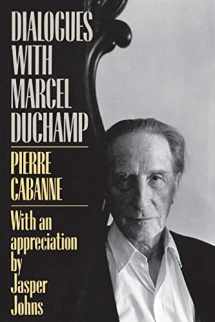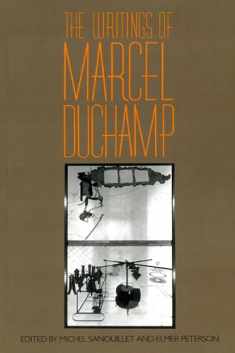
Dialogues With Marcel Duchamp
ISBN-13:
9780306803031
ISBN-10:
0306803038
Author:
Pierre Cabanne
Publication date:
1987
Publisher:
Da Capo Press
Format:
Paperback
152 pages
Category:
Essays
,
Individual Artists
,
Criticism
,
Arts History & Criticism
,
History
FREE US shipping
Rent
35 days
Due Jul 17, 2024
35 days
from $17.22
USD
Book details
ISBN-13:
9780306803031
ISBN-10:
0306803038
Author:
Pierre Cabanne
Publication date:
1987
Publisher:
Da Capo Press
Format:
Paperback
152 pages
Category:
Essays
,
Individual Artists
,
Criticism
,
Arts History & Criticism
,
History
Summary
Dialogues With Marcel Duchamp (ISBN-13: 9780306803031 and ISBN-10: 0306803038), written by authors
Pierre Cabanne, was published by Da Capo Press in 1987.
With an overall rating of 3.7 stars, it's a notable title among other
Essays
(Individual Artists, Criticism, Arts History & Criticism, History) books. You can easily purchase or rent Dialogues With Marcel Duchamp (Paperback) from BooksRun,
along with many other new and used
Essays
books
and textbooks.
And, if you're looking to sell your copy, our current buyback offer is $0.4.
Description
With an introduction by Robert Motherwell and an appreciation by Jasper Johns
"Marcel Duchamp, one of this century's pioneer artists, moved his work through the retinal boundaries which had been established with Impressionism into a field where language, thought and vision act upon one another. There it changed form through a complex interplay of new mental and physical materials, heralding many of the technical, mental and visual details to be found in more recent art. . .
"In the 1920s Duchamp gave up, quit painting. He allowed, perhaps encouraged, the attendant mythology. One thought of his decision, his willing this stopping. Yet on one occasion, he said it was not like that. He spoke of breaking a leg. 'You don't mean to do it,' he said.
"The Large Glass. A greenhouse for his intuition. Erotic machinery, the Bride, held in a see-through cage-'a Hilarious Picture.' Its cross references of sight and thought, the changing focus of the eyes and mind, give fresh sense to the time and space we occupy, negate any concern with art as transportation. No end is in view in this fragment of a new perspective. 'In the end you lose interest, so I didn't feel the necessity to finish it.'
"He declared that he wanted to kill art ('for myself') but his persistent attempts to destroy frames of reference altered our thinking, established new units of thought, 'a new thought for that object.'
"The art community feels Duchamp's presence and his absence. He has changed the condition of being here."--Jasper Johns, from Marcel Duchamp: An Appreciation
"Marcel Duchamp, one of this century's pioneer artists, moved his work through the retinal boundaries which had been established with Impressionism into a field where language, thought and vision act upon one another. There it changed form through a complex interplay of new mental and physical materials, heralding many of the technical, mental and visual details to be found in more recent art. . .
"In the 1920s Duchamp gave up, quit painting. He allowed, perhaps encouraged, the attendant mythology. One thought of his decision, his willing this stopping. Yet on one occasion, he said it was not like that. He spoke of breaking a leg. 'You don't mean to do it,' he said.
"The Large Glass. A greenhouse for his intuition. Erotic machinery, the Bride, held in a see-through cage-'a Hilarious Picture.' Its cross references of sight and thought, the changing focus of the eyes and mind, give fresh sense to the time and space we occupy, negate any concern with art as transportation. No end is in view in this fragment of a new perspective. 'In the end you lose interest, so I didn't feel the necessity to finish it.'
"He declared that he wanted to kill art ('for myself') but his persistent attempts to destroy frames of reference altered our thinking, established new units of thought, 'a new thought for that object.'
"The art community feels Duchamp's presence and his absence. He has changed the condition of being here."--Jasper Johns, from Marcel Duchamp: An Appreciation


We would LOVE it if you could help us and other readers by reviewing the book
Book review

Congratulations! We have received your book review.
{user}
{createdAt}
by {truncated_author}




